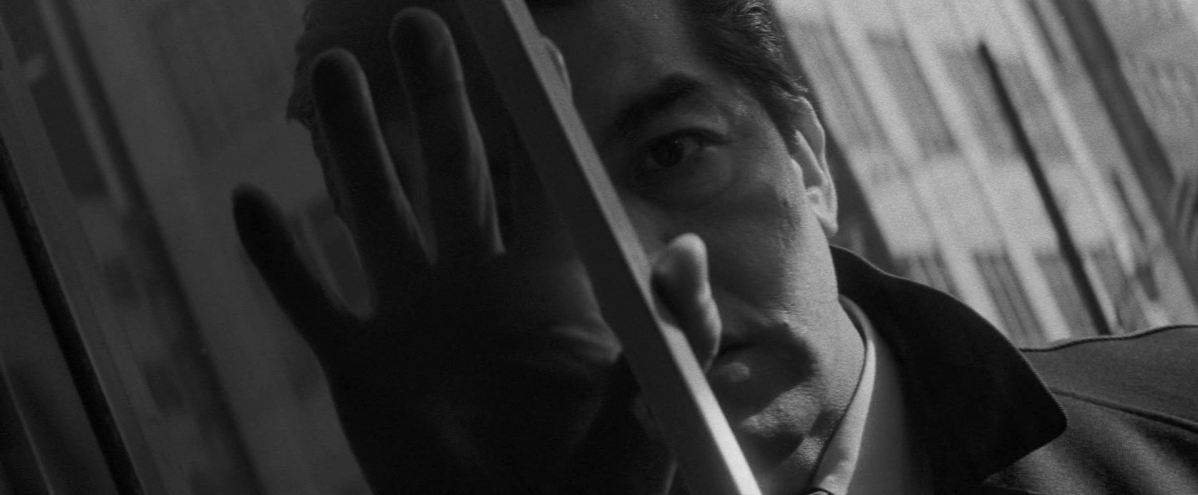
Written by Richard Durrance on 26 Oct 2024
Distributor Arrow • Certificate 15 • Price £18.00
Just when you think there can surely be no more Kinji Fukasaku releases in 2024 along comes Arrow’s The Threat (1966) - and I’d add we know Radiance have another this year too – and not just that but it’s the first release outside Japan, which makes it a rather tasty proposition.
Returning home after a wedding, Misawa (Rentaro Mikuni) and his wife Hiroko (Masumi Harukawa) and young son open the door only to be invaded by two death row escapees, Kawanishi (Ko Nishimura) and Sabu (Hideo Murota), with a kidnapped baby in tow. They force Misawa to help them extort money from the baby’s family and plan to flee the country.
The Threat as a film in the increasingly available Fukasaku cannon is a fascinating one because it’s more obviously a genre thriller than many of those others available. By which I mean the plot is one that for the most part you can lift and shift to anywhere in the world, any time or place. At first I wasn’t sure if this might play out like the Bogart film, The Desperate Hours but it doesn’t. If anything then the film shows Fukasaku’s skill as a director because of how he is taking something arguably standard and then shows what he can do with the material.
Some of this, especially in the first half of the film, relates to character. Of the two escapees it is no surprise perhaps that you have Kawanishi who is the more intelligent, thoughtful, even perhaps on one level empathetic villain who does not want to use violence against the family, is able to fix Misawa’s son’s Scalextric, and then there is the more emotionally driven, overtly dangerous Sabu. Of the two you can be sure that Kawanishi is the more dangerous of the two. Yet the character that becomes more nuanced than expected is perhaps Hiroko. There are moments where she has to fight off Sabu, to whom raping her is no more than an extension of uncontrollable passions, and so she could be sidelined to a mother protecting her child, the kidnapped baby, and her honour, but she is given a more rounded character and shown to be passionate. There’s a fascinating love scene between herself and her husband that reminded me of the confused passion in Cronenberg’s A History of Violence nearly 40-years earlier.
The first half closely follows the standard thriller format. True, Fukasaku handles it beautifully, often creating compelling images through framing, even of just a telephone ringing, but it is in the latter half, when the question of the ransom needing to be paid is arguably where the film becomes something more recognisably by the director. As the story takes literally to the streets, his handheld cameras follow the action, creating a more chaotic feel that fits the unravelling of the convicts' plans.
One important piece of this unravelling is Mikuni as Misawa. In films he so often looks like the pained everyman and here especially. Even at the wedding where Misawa is giving a speech about the bride and groom, both who work in his company, it’s clear that people think the groom will usurp Misawa. That’s how he’s seen, a nice guy, decent, but not capable of anything more. And so on one level there is a part of the film that is Misawa being the man pushed one step too far, this doesn’t take itself to extremes of violence as you might expect ala Death Wish or similar, but instead he is pushed so that though he follows orders, he starts to subvert them, to make them work for him. We get into Misawa’s inner workings, his emotions, his feelings and this drives the latter stages of the film. Mikuni is great at this kind of conflicted character, diffident yet possibly capable of disturbing action. It’s all there on his face.
So as Misawa starts to be less passive (his son at one stage even calls him a coward) it’s not a surprise, because we can see in him that gradual emotional change and emotional distress that leads to a cracking climax to the film, which feels much more in keeping with Fukasaku’s other work - it’s not clean and tidy but instead shows a normal man pushed to extremes. That said as much as this may seem like a film of two halves it’s a fluid piece of work, even if perhaps not as singular as say Eureka’s recent Wolves, Pigs and Men, shot two years previously (and in which Mikuni plays the elder brother).
Nevertheless, the more we have rarer Fukasaku films being released the better and with at least one more this year, let us hope 2025 continues with the trend.


Long-time anime dilettante and general lover of cinema. Obsessive re-watcher of 'stuff'. Has issues with dubs. Will go off on tangents about other things that no one else cares about but is sadly passionate about. (Also, parentheses come as standard.) Looks curiously like Jo Shishido, hamster cheeks and all.
posted by Richard Durrance on 03 Feb 2026
posted by Richard Durrance on 27 Jan 2026
posted by Richard Durrance on 19 Jan 2026
posted by Richard Durrance on 08 Jan 2026
posted by Richard Durrance on 17 Dec 2025
posted by Richard Durrance on 12 Dec 2025
posted by Ross Locksley on 09 Dec 2025
posted by Richard Durrance on 28 Nov 2025